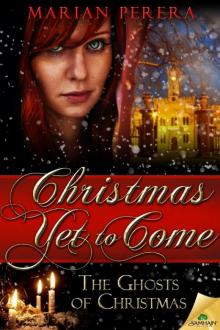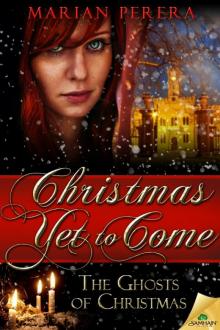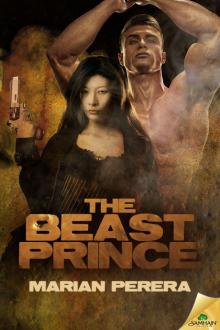- Home
- Marian Perera
Christmas Yet To Come (The Ghosts of Christmas) Page 5
Christmas Yet To Come (The Ghosts of Christmas) Read online
Page 5
Really, what had he been expecting to find? Boxes of red ribbons and glass bells and frosted baubles miraculously still there? He sat down on a box, which creaked. Now what?
Well, he could have a meal laid out. Mrs. Rowe, his cook, had left enough food. But he’d promised Laura a celebration. He wanted to give her something to remember him by before she left, but more than that, he wanted to see her smile, a pretty flush riding high on her cheekbones and her face lit up so her eyes glowed. For all of her afterlife, there had never been spring or summer or autumn, only the bleakest face of winter. He could change that, at least for one night.
All right, think. He had to be like her, innovative enough to turn a candlestick into a cutlery receptacle. What a pity about the snowfall; if not for that, he might have gone out to cut sprigs of holly and yew branches to fill vases. He could even have collected handfuls of wispy old-man’s-beard to decorate the edges of the shelves.
Wait, there were pine cones. Mrs. Rowe used those as cheap firestarters, and he was sure she had plenty. He could scatter flour or salt to make the cones look tipped with snow or frost. That was a start. And he had plenty of leftover paper. He could do something with that, maybe make a lantern chain.
Which might look childish and economical, to put it politely, something he wouldn’t normally have dreamed of doing. But there had been no self-pity at all in Laura’s voice when she’d spoken of what had happened to her, so he tried not to be embarrassed about his own situation either.
Of course, she’d had years to come to terms with her life, or lack thereof. Though she didn’t look like a girl left sleeping forever beneath ice. Oh, she was young, but there was none of that girl’s innocence in the calm steady eyes that had seen too much. She hadn’t even blinked when she’d told him he would die unless she left.
He still wasn’t sure what to make of that. If he’d been told someone had predicted his death, it would have sounded like cross-my-palm-with-silver nonsense that would only disturb the credulous. Not that it bothered him hearing it so directly, but he disliked it nonetheless. If the implication was that misfortunes up to and including murder were part of some great plan, Justin would have preferred not to believe he’d displeased any divine power to that extent.
Of course, it could be argued that Laura had been sent to him for that very reason, to save him from an unjust death, but he didn’t like that either. It was hardly fair to her, to drop such an unasked-for responsibility in her lap. He could tell she enjoyed living again, and certainly eating again, but now she’d have to give that up, just as she’d lost everything else once. He wondered if she would keep any memories of him or if those would be gone too.
He’d believed everything she said, he realized a moment later. Under any other circumstances, he might have thought she was either delusional or trying some confidence trick on him, and his profession had made him good at watching people’s faces and bodies for the involuntary signs they were lying or nervous.
None of which had showed with Laura. Her crystal-grey gaze had met his directly, and she’d been more flustered at breakfast when she’d made the mistake of eating out of the sugar bowl. The truth certainly explained all those little eccentricities of hers. Not to mention how she’d ended up within locked gates wearing a shroud.
After she’d left his bedroom, he had examined the wall carefully, running his hands over it for good measure, but it felt like solid stone. So what she’d done left him three choices. He could believe there was something wrong with his eyes and/or mind, which was why he’d just seen a woman walk through a wall, he could come up with his own explanation of how that trick had been performed, or he could accept her story.
He was perfectly sane, he didn’t see things that weren’t there, and he couldn’t unravel the secret behind the trick. Which left only one option. Just his luck. If she was telling the truth, she’d be gone before the next morning.
Determinedly, he turned his thoughts away from that and went back down to the kitchen for the pine cones. Finding a barrel of apples in the cellar, he carried up an armful of those as well, and as he worked to decorate the parlor he forgot everything else but the novelty of the task. He even found himself humming “God Rest Ye Merry Gentlemen”. And somehow, making the best out of so little seemed like an accomplishment too.
Besides, when he was finally done, he looked around with a feeling that Laura would be charmed by the end result.
And that was all that mattered.
After hanging the shroud up in the wardrobe, Laura sat on her bed to wait. The hours until supper lasted for weeks. She had never anticipated a Christmas Eve before, and she wished there was something she could actually do.
Finally she went down to the kitchen, boiled water and took a jug up to her bedroom, to wash as best she could. After she had finished, she wrapped herself in the dressing gown and combed her hair, hoping her appearance was appropriate.
No, not quite, because there were line drawings of women in some of the books, and all of those women had their hair up, arranged and styled attractively. She didn’t know how to begin to do that. Better to leave her hair the way it was than try to ape a fashion and look foolish as a result. Studying herself in the mirror, she made herself smile. That was the most she could—
A crack raced over the surface of the mirror. It sliced the reflection of her face in two.
Laura jerked back, but nothing further happened except for the edges of the crack fusing together. The split melded as she watched, and the mirror was whole again. It might never have happened, except for the pounding of her heart and the gooseprickles covering her arms.
Damn it. Even if she called Justin, there was nothing she could show him, and that had been a warning for her. Except she didn’t know what exactly she was being warned about.
Feeling vulnerable—which was new—she hastily struggled back into her borrowed clothes and sat down to wait. She had expected a knock at the door, but instead a bell rang downstairs. The sound disquieted her; it was high and piercing, oddly disconnected from human contact, as if the bell had rung on its own.
No, that was ridiculous. She was jumpy after seeing the crack in the mirror, and if Justin wanted to celebrate Christmas, she wouldn’t cast a shadow over his efforts by imagining things.
Tossing her hair back, she straightened her shoulders and went downstairs.
The fragrance of cinnamon stole into her senses, warm and redolent of spices, but beneath it was the crispness of apples and a sweeter scent like oranges. She quickened her pace, but stopped in the doorway of the parlor.
She hadn’t expected it to look very different from what she’d seen last night, and indeed, it didn’t. Justin hadn’t had much to work with, after all. But the furniture had been polished, and gleams of well-kept brass shone from the fire irons and the bell on the mantelpiece. A low table had been drawn up before the fire, and on it was a little stub of tree that she guessed had been cut from one of the shrubs flanking the front door. Apples filled a basket, one of them studded with cloves. The mantelpiece was hung with a chain of red paper flowers that looked vivid in the firelight, and beside the fireplace was another sheaf of flowers in a paper cone patterned with music notes, which might have been taken from the book of sheet music.
Justin stood at the sideboard filling two glasses, but to her relief, he wore the same velvet jacket and shabby trousers, so she didn’t feel plain in her blue dress. “I’m afraid the brandy’s all finished.” He looked slightly embarrassed as he gave her one of the glasses. “All we have is sherry.”
“Oh, I don’t mind,” Laura said. “The place is lovely. Where did you get all those red flowers from?”
The apologetic expression vanished in a smile. He didn’t seem different when he smiled, except for the way it lit up his eyes as though they reflected the dozen or more candles that lighted the room. “I folded them out of scrap paper, and there are more
uses for red ink than the debits column. Uh, this is for you.”
He took a flat package from a pocket and pressed it into her free hand. The wrapping was plain brown paper, but he had drawn a picture on it—a snowman in the garden, looking into a window of the house.
“I—thank you.” She took the gift out of sheer reflex, too startled to refuse. “What is it?”
“It’s a Christmas present,” Justin said. She leveled a look at him. “Oh, sorry. It’s a volume of Swinburne’s poetry. Not new, unfortunately, but I thought you might like it.” He frowned. “Unless you can’t take anything at all back with you?”
Laura wished she could. He’d even given her a gift. Until then, she’d more or less tolerated being human again. Some aspects of that had been pleasant, but others had been frustrating, as if to balance the experience.
Suddenly, though, it was wonderful.
Without thinking, she put her arms around him—carefully, because she didn’t want to spill the sherry—and rested her cheek against the softness of his jacket for a moment, all she could allow herself. His free arm went around her waist, but before he could tighten the embrace, she slipped free.
Heat crept up her throat and she couldn’t quite meet his eyes, but she darted a skittish glance up through her lashes. His throat moved as he swallowed, and he didn’t look at ease either.
But he recovered first. “Merry Christmas.” He lifted his glass and clinked it against hers.
She sat down before the fire with her book in her lap. Pine cones were crackling in the flames, and the lit candles on the sills looked even brighter against the night beyond the windows.
“I’ve been wondering,” he said as she sipped her sherry. “If your whole purpose is to make people celebrate Christmas, what about those who were raised Hindus, or Jews?”
Laura knew little about life beyond the narrow scope of what had been her duties, but she supposed people of other religions had their own holy days. “I think it would be unfair at best to expect someone of a different faith to celebrate Christmas. And if I felt I was treating people unfairly, it wouldn’t have taken me twenty years to want a change.”
The cool assessment in his expression softened, but she knew better than to expect him to be satisfied with the explanation, and sure enough he went on. “Still doesn’t seem entirely right to me. I mean, even those who start out Christian can lapse.”
“Like you?”
“I read the National Reformer. What does that tell you?”
“It tells me you read the National Reformer, whatever that is.” Laura felt she’d done more hard thinking in the last few days than she had in the past two decades. “It doesn’t have anything to do with being a devout churchgoer, you know. It’s more a question of whether you have kindness and compassion.”
“And you don’t think I do.”
She saw through that at once: if she admitted he was generous and considerate, her whole purpose as a ghost came into question. But no one could have called him mean-spirited after everything he had done for her.
“Are you kind to yourself?” she asked.
He didn’t seem to have a rejoinder to that, and when he raised his glass, it looked more of a salute to her than a toast. To her relief, he went on to the topic of their dinner, and told her he was unfortunately of not much use in the kitchen. “So all I have is a cold chicken my cook prepared before she left. Oh, and ginger cake.”
“That sounds delicious,” Laura said, deciding the gracious response to a victory would be to call no attention to it, but once he got up to fetch their meal, she checked the clock on the mantelpiece. Almost nine already.
She wasn’t sure if she had till midnight or until the last minute before three, because the Ghost of Christmas Yet To Come always appeared at the stroke of the third hour after midnight. Either way, it was hardly enough time to read her book, not that she wanted to spend her few remaining hours reading.
For once her appetite deserted her, and she knew Justin could tell when he glanced at her plate, but he said nothing about it. Instead, he told a few stories of his work as a banker, including how he’d once spotted a counterfeit five-pound note and, following protocol, had detained the man who’d given it to him until a police constable arrived.
“So the constable came in,” he said. “The fake banknote was on a table where the suspected counterfeiter couldn’t have reached it. The constable asked if he could compare it to a genuine fiver to be certain, but when he did, there was no difference. The two notes were identical. I thought I’d made a horrible mistake. The suspected counterfeiter threatened to sue me for slander, but the constable told him to calm down and leave quietly because I was just doing my job.”
Laura thought that over. “But you were sure it was a fake?”
“Originally, yes.”
“Who went near it between your original inspection and the constable picking it up?”
“No one.”
That left only two possibilities—either Justin was wrong, or the constable had switched the note for a real one, and when she said so, he chuckled. “You’re right. Thankfully that occurred to me, and we managed to delay them both while we sent an urgent message to the nearest police station with the constable’s name. They’d never heard of him, so they came to investigate. Apparently he and the counterfeiter worked together, and his job was to go into the bank to spring the trap if his partner seemed to be delayed there for any reason.”
Pleased though she was that she’d guessed right, she didn’t like the idea of someone trying to deceive him when he had been working honestly. It was odd, because while she had been indignant about her being reduced to humanity and thrown into a snowbank, she hadn’t imagined she could feel the same on someone else’s behalf.
“I wondered,” she said. “Let’s say someone died and left you a million pounds.”
Justin sighed, shaking his head. “It’s always about someone dying.”
She tried to hide any amusement at the theatrical response. “Fine. You saved the Queen’s life and she gave you a million pounds. It’s the money that matters, not how you came into it.”
Justin looked horror-stricken. “Do I have to pay taxes on it?” She folded her arms and he stifled a laugh. “I beg your pardon. Please go on.”
“With that much money, would you work?”
He leaned back in his chair. “I suppose not. I could live off the interest.”
“And do what?”
She hadn’t expected a quick teasing riposte, and sure enough, there was none. All the humor faded from his face, and he looked as he had done when he’d first let her into the house: uncertain because he didn’t know what to do under those particular circumstances.
“I’d take painting lessons,” he said finally, as if admitting he would have to learn how to dress himself in the morning.
“Really?” That had been the last thing she’d expected to hear. On the other hand, she only had to look at the parlor to know he could be imaginative when it was called for.
Justin looked even more embarrassed. “I used to paint occasionally, when I had time. There are a few canvases wrapped up in the attic.”
“Why don’t you display them?” Laura thought he’d have his choice of bare walls anywhere, but at once she realized the answer. “Oh.”
“They’re not good enough. I had everything correctly proportioned, and no mistakes in perspective. The colors never clashed. But there was always something missing.”
“Like what?”
He shrugged. “Whatever makes people stare at a masterpiece in a museum and talk about it afterwards.”
“Every painting can’t be a masterpiece.”
“I know, but there was always something—flat about mine.” He frowned. “Conventional. I painted still lifes of fruit, and the garden. But everyone paints landscapes. Perhaps it’s a matter of te
chnique—”
He stopped so abruptly she glanced at the clock to make certain her time wasn’t at an end yet. “That was a terrible answer,” he said. “I should have said I would set up a hospital or endow scholarships.”
“Justin, I wasn’t trying to put you on trial.” She realized a moment later that it was the first time she had used his name, and she went on quickly. “I only wondered what you would do if you had more time to yourself.”
It was a pity she had to leave, because she would have liked to see the paintings. Then again, she would have liked to do so many things. She knew the reason she’d asked him that question hadn’t just been to open him to all the possibilities of what he could do with the time he had left, all the choices still to make. It had been because she couldn’t afford to have any secret dreams of her own.
The awkward moment seemed to pass, and he looked at her thoughtfully. “What would you do, if I sat you in front of a blank canvas and gave you a bowl of fruit?”
“Probably eat one or two pieces, but the rest…” Laura finished her sherry to give herself time to think. “I’d paint it as close to life as I could, except for an apple growing out of a pear.”
Justin’s brows went up. “The realism to ground the audience, and the strange touch to make them look twice. Like an English country garden with a gazelle eating the bluebells.”
Laura nodded. “And you didn’t need to pay me your million pounds for that.”
He laughed. “Oh, the money wouldn’t be nearly enough thanks. A portrait, on the other hand…”
He didn’t finish, and once again she knew exactly what he was thinking of—the kind of portrait that would never be for public view. “With an apple growing out of my head?” she said lightly, to change the mood, and he let the matter drop as he cut more cake for them both.

 Christmas Yet To Come (The Ghosts of Christmas)
Christmas Yet To Come (The Ghosts of Christmas) Christmas Yet to Come
Christmas Yet to Come The Coldest Sea
The Coldest Sea The Beast Prince
The Beast Prince The Deepest Ocean (Eden Series)
The Deepest Ocean (Eden Series) The Highest Tide
The Highest Tide